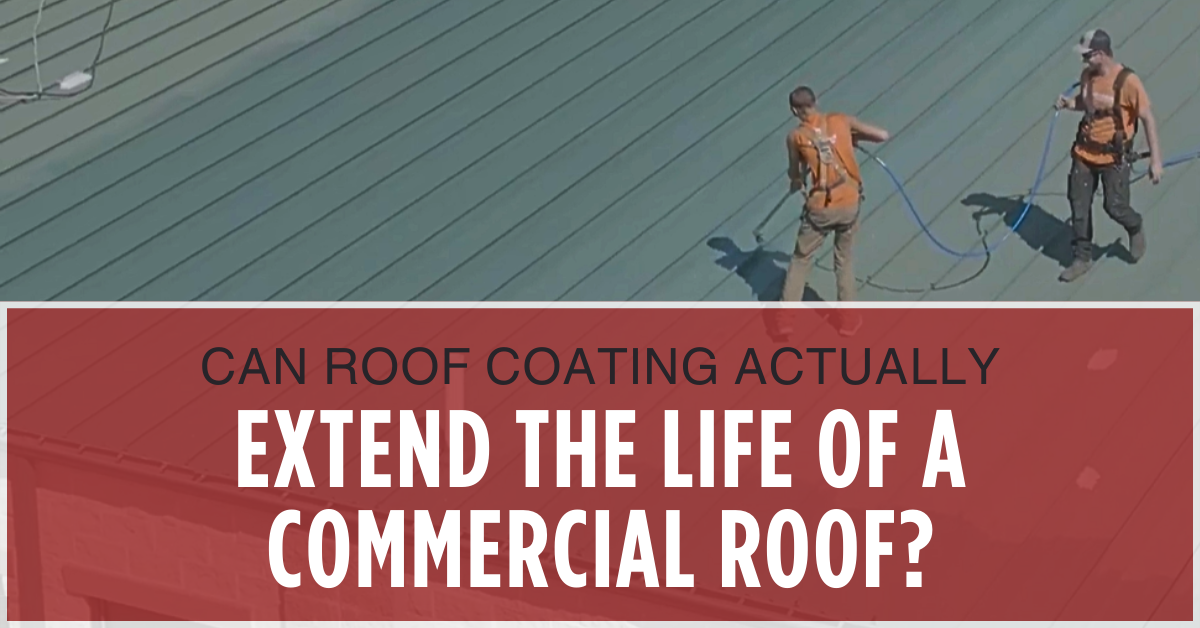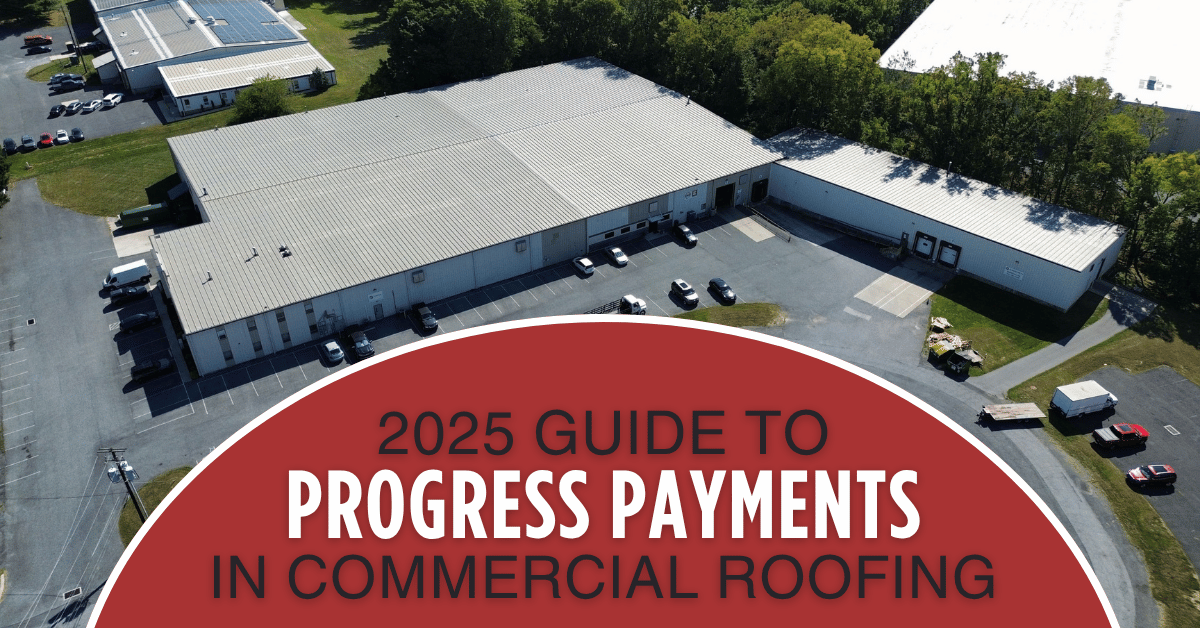.png)
Are you worried about how you'll pay for a new roof on your business’s building? Do you wonder what financing options exist, and which ones are actually worth considering?
If you're running a business or managing a facility in Central PA, a commercial roofing project can feel like a massive financial undertaking. Whether it's a full replacement or major repair, the costs often come with more zeroes than most companies are ready to handle upfront.
We're Equity Commercial Roofing, certified roofing experts with GAF, Owens Corning, Carlisle, Versico, OSHA, and Firestone. We’ve seen firsthand how neglected roof issues can cause more expensive problems down the road, and we are dedicated to helping businesses find financing solutions that actually work for them.
In this guide, we'll break down the most common ways to finance a commercial roof in Central Pennsylvania so that you can take care of your roof faster! You'll learn about your options, how they compare, and how to determine which one best fits your needs.
Clickable Table of Contents
- Costs for Common Roof Repairs
- Roof Replacement Price Ranges by Type and Size
- 5 Common Roof Financing Options for Central PA Businesses
- Frequently Asked Questions About Commercial Roof Financing
- Complete Commercial Roof Cost Guide
How Much Does a Commercial Roof Cost?
If you're like many business owners in Central PA, you've probably put off a roofing project because of cost concerns. It’s understandable; a roof can take up a fairly large chunk of your annual budget,
Roof repair costs vary widely, particularly for leaks, which can range from $1,200 to $10,000 or more. Even basic repairs add up quickly!
Costs for Common Roof Repairs
| Repair | Typical Cost |
| Small Roof Leak | $1,200 to $2,500 |
| Severe Roof Leak | $5,000 to $10,000+ |
| Pipe Boot | $900 to $1,000+ |
| Popped Nails | $1,800+ |
| Ridge Vent | $1,500+ |
| Wind Damage | $800+ |
Meanwhile, a full roof replacement for a commercial roof can range from $25,000 to $1,425,000, depending on its size, materials, complexity, and type of warranty.
Roof Replacement Cost by Type and Size
| Material | Small Buildings (5,000–7,000 sq ft) |
Medium Buildings (20,000–40,000 sq ft) |
Large Buildings (100,000+ sq ft) |
| TPO: $8.00 per sq ft | $42,000 to $60,000 | $160,000 to $320,000 | $800,000 to $1,200,000 |
| EPDM: $8.50 per sq ft | $45,000 to $75,000 | $170,000 to $340,000 | $850,000 to $1,275,000 |
| PVC: $9.50 per sq ft | $50,000 to $85,000 | $190,000 to $380,000 | $950,000 to $1,425,000 |
| Shingle: $5-6 per sq ft | $25,000 to $42,000 | $100,000 to $240,000 | $500,000 to $900,000 |
| Metal: $7-8 per sq ft | $35,000 to $56,000 | $140,000 to $320,000 | $700,000 to $1,200,000 |
Don’t let these price ranges trick you into believing a roof isn’t in this year's budget. Financing has become a vital tool for preserving cash flow, avoiding operational disruptions, and protecting assets without requiring a massive upfront investment.
5 Common Roof Financing Options for Central PA Businesses
Below are the five most common financing options available to commercial building owners in Pennsylvania:
Financing for Commercial Roofs
| Financing Option | How It Works | How to Apply | Best For |
| Traditional Bank Loans | Borrow a lump sum from your bank to pay for the roof, repaid over time with interest. | Apply through your bank/credit union with financial statements and a roofing estimate. | Established businesses that need predictable, long-term repayment. |
| Commercial Lines of Credit | A revolving credit line you can draw from as needed for roofing repairs or replacements. | Request through your bank; requires good credit and revenue documentation. | Businesses that want flexible financing for phased or future roof needs. |
| SBA Loans (7a, 504, Disaster) | Government-backed loans with lower rates and long repayment terms. | Apply via SBA-approved lenders, which involves detailed financial paperwork. | Larger projects or established businesses can wait for approval. |
| Commercial Real Estate Equity Loans | A lump-sum loan secured by the equity in your building, often with lower rates and longer terms. | Apply with your bank or commercial lender; requires property equity and documentation. | Property owners with significant equity are tackling large roof replacements. |
| Government Incentives (PACE/C-PACE) | Financing tied to energy efficiency, repaid through property taxes over time. | Apply through a local C-PACE administrator; requires proof of energy upgrades. | Owners adding insulation, reflective roofing, or solar-ready systems. |
1. Traditional Bank Loan
A traditional bank loan is a fixed-term loan from your bank or credit union that provides a lump sum for your roofing project, repaid with interest over time.
Pros:
- Potentially low interest rates
- Flexible loan amounts and terms
- Trusted financial institution
Cons:
- Lengthy approval process
- Extensive paperwork
- May require a lien or personal guarantee
Approval typically takes 2-6 weeks, depending on the bank, your credit history, and how quickly you provide documentation.
2. Commercial Lines of Credit / Business Credit Lines
Commercial Lines of Credit (also known as Business Credit Lines) is a revolving credit account from your bank that you can draw from as needed for roofing expenses, paying interest only on the amount you use.
Pros:
- Flexible: only pay interest on what you use
- Can cover both small repairs and large projects
- Reusable for future building needs
Cons:
- May have higher interest rates than term loans
- Lower limits than other loan options
- Requires good credit and a strong banking relationship
Approval Time: If you already have a strong banking relationship, approval can be as fast as a few days to a week. New applications may take 2-3 weeks.
3. Small Business Administration (SBA) Loans
Small Business Administration (SBA) loans may be available for roof repairs (SBA 7(a) Loan), roof replacement (504 Loans), and roofs damaged by disasters (Disaster Assistance).
Pros:
- Lower interest rates and longer terms than many traditional loans (up to 25–30 years).
- High borrowing amounts (7(a) up to $5 million; 504 up to $5.5 million) — enough for even the largest roof projects.
- Government backing makes lenders more willing to approve businesses that might not qualify otherwise.
Cons:
- Lengthy approval process: paperwork-heavy, often taking weeks or months.
- Eligibility requirements: good credit, strong financial history, and sometimes personal guarantees are needed.
- Narrow usage or restrictions on how the loans can be used
Approval Time: Expect 4-12 weeks for most SBA loans due to government paperwork and lender review. Disaster Assistance loans may be quicker, often 2–4 weeks.
4. Commercial Real Estate Equity Loan
A Commercial Real Estate Equity Loan is a lump-sum loan secured by the equity in your building, often with lower rates and longer terms, used to fund major improvements like a roof replacement.
Pros:
- Lower interest rates compared to unsecured loans
- Longer repayment terms available
- Large borrowing amounts possible, tied to property value
Cons:
- Only available to businesses that own their building and have sufficient equity
- Requires property appraisal and collateral, which can delay funding
- Risk of foreclosure if you default on payments
Approval Time: Typically 3-6 weeks, depending on the lender, property appraisal timeline, and how quickly documents are submitted.
5. Government Incentives and Energy-Efficient Financing
If your roof project includes energy efficiency upgrades, such as cool roofs or solar, you may qualify for special government-backed financing. C-PACE (Commercial Property Assessed Clean Energy) is available in Pennsylvania and lets you repay the project through property taxes over time.
Pros:
- Long repayment terms up to 20 years
- Repayment tied to property, not person
- Often doesn't require personal guarantees
Cons:
- Only available in participating counties
- Requires local approval
- Best for specific energy-efficient projects
Frequently Asked Questions About Commercial Roof Financing
Common question we've received about financing a commercial roof:
How much does it cost to replace a commercial roof in Central Pennsylvania?
The cost of a commercial roof replacement can range from $25,000 to $1,425,000, depending on size, materials, and complexity. Here's a quick breakdown:
- TPO & EPDM: ~$8.00–$8.50 per sq ft
- PVC: ~$9.50 per sq ft
- Metal: ~$7.00–$8.00 per sq ft
- Shingle: ~$5.00–$6.00 per sq ft
Repairs also vary widely, from $1,200 for minor leaks to $10,000+ for major water damage.
What’s the most common way businesses finance a commercial roof?
The most common methods include:
- Traditional Bank Loans (fixed terms, predictable payments)
- SBA Loans (government-backed, long-term)
- Commercial Lines of Credit (flexible, revolving credit)
- Equity Loans (secured by your building)
- C-PACE (energy-efficient upgrades repaid via taxes)
How long does it take to get financing approved?
Approval times vary by financing type:
- Bank Loans: 2–6 weeks
- Lines of Credit: A few days to 3 weeks
- SBA Loans: 4–12 weeks
- Equity Loans: 3–6 weeks
- C-PACE: Varies by county and project scope (4–8 weeks is typical)
Can I finance just a portion of the roof project?
Yes. Many lenders allow partial financing. For example:
- Use a line of credit for repairs now and save the full roof replacement for later.
- Combine insurance coverage with a loan to bridge the gap.
- Some contractors may also offer split payment plans.
Do I need to own the building to qualify for financing?
Not always, but it depends:
- Equity loans and C-PACE require property ownership.
- SBA loans and bank loans can apply to long-term tenants with lease rights and proof of investment interest.
Consult with your contractor and lender to determine their documentation requirements.
What roof upgrades qualify for energy-efficient financing like C-PACE?
To qualify for C-PACE in PA, your roof must include energy-saving features such as:
- Reflective TPO/PVC membranes
- Improved insulation (R-value upgrades)
- Solar-ready infrastructure or mounting brackets
- Green roofs or drainage improvements
Many of these upgrades can lower your energy bills and qualify for federal tax incentives.
What Commercial Roof Financing Option is Right for Your Building
If you’ve been putting off a roof repair or replacement because of cost, just know that you’re one of many. Central PA businesses, both small and large, face the same challenge.
However, now you know that multiple financing options are available, including traditional bank loans, SBA programs, and C-PACE incentives. Each one can make a major roofing project more manageable without disrupting your cash flow.
The next step is to determine which approach best suits your business. At Equity Commercial Roofing, we’ll guide you through the options, provide clear cost expectations, and help you choose a path that keeps your operations protected without straining your budget.
Start by exploring the 2025 Commercial Roof Cost Guide or scheduling a free roofing and financing assessment with our team.

Can Roof Coating Actually Extend the Life of a Commercial Roof
What if you could avoid a full roof replacement and still get 10 to 20 more years from your commercial roof? And what if doing so could cost you...

2025 Guide to Progress Payments in Commercial Roofing
If you're planning a commercial roofing project, chances are you'll be asked to approve “progress payments” as part of your contract. For many...


.png)